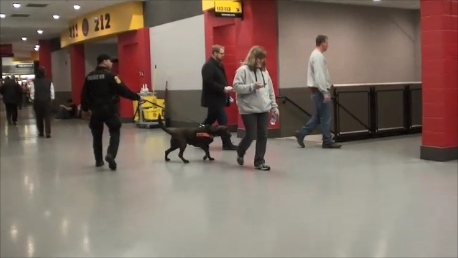Press Release
APL Develops and Licenses Safe Explosive Training Aid for Canines
Mon, 02/19/2018 - 11:47

Credit: APL
Researchers at the Johns Hopkins University Applied Physics Laboratory (APL), in Laurel, Maryland, have successfully developed and licensed a safer training aid to improve canine detection of homemade peroxide explosives. These new training aids are safe and effective, require no special handling or storage, and allow for greater frequency of training in realistic environments like airports, stadiums or mass transit areas.
Homemade peroxide explosives are used extensively by terrorist organizations because they are easy to prepare and difficult to detect. Because of their keen sense of smell, canines are among the best sensors to detect explosives, but training can be challenging. Working with live, detonable explosives poses obvious logistical and safety hazards, and simulants often contain misleading smells.
Maryland-based Gallant Technologies has licensed the rights to make and sell the training aid. APL developed the government-funded non-detonable training aids by rendering pure, detonable explosives inert using a patented process that does not contribute any additional odors that can confuse canine handler teams.
“Licensing this technology to Gallant has made it more available to the explosives detection canine community. Ultimately, technologies like these will help prevent and deter devastating attacks, and facilitate the ongoing development of new sensors and preventive measures,” said Heather Curran, technology and marketing manager in the APL Office of Technology Transfer.
Gallant Technologies has begun production, performed the required shipping and quality testing rounds, and obtained approval for unrestricted shipping from the Department of Transportation. To date, Gallant Technologies has manufactured thousands of training aids required for testing and has begun delivery of the commercial training aid in small quantities to various law enforcement agencies, research groups and independent quality assurance laboratories.